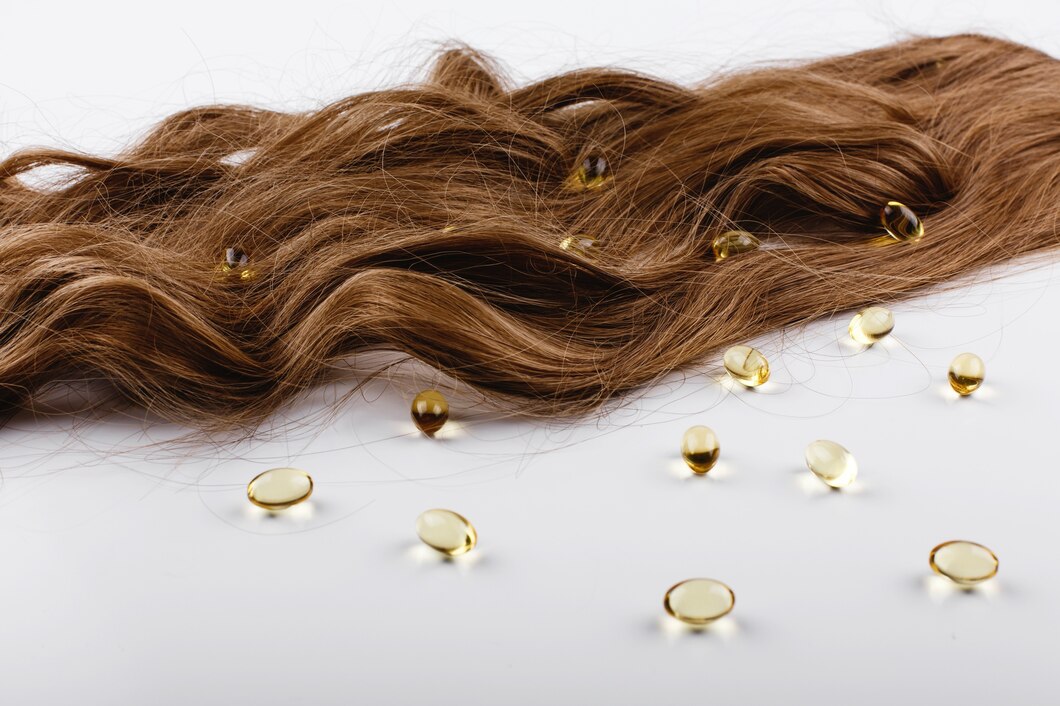Keratin:everything you need to know about this food supplement
What is keratin and where does it come from?
Keratin is a fibrous protein found in large quantities in the hair, nails and skin. Its role is to strengthen and protect these body tissues. This protein is produced naturally by the human body, but it can also be consumed as a dietary supplement.
Keratin is mainly made up of amino acids such as cysteine, methionine and lysine. It is also rich in sulphur, an important element for healthy nails and hair. Keratin production also depends on the intake of B vitamins, particularly biotin, and minerals such as zinc.
Keratin is also present in certain foods, such as meat, eggs, fish, beans and nuts, but in much lower doses than those found in food supplements.
What are the benefits of keratin for the human body?
Keratin has a number of beneficial effects on the human body, particularly on the hair, nails and skin.
The hair
Keratin is often used to improve hair health. This protein can help strengthen hair and make it more resistant to damage caused by heat, chemicals and environmental factors. It can also help improve the appearance of hair by adding shine and suppleness.
Keratin can also help reduce hair breakage and stimulate hair growth. It can be particularly beneficial for people with damaged, dry and brittle hair due to repeated chemical treatments or exposure to heat.
Nails
Keratin is also important for nail health. A lack of keratin can lead to brittle, ridged and dull nails. By taking keratin-based food supplements, you can strengthen your nails and make them healthier and stronger.
Taking keratin can also help regulate nail oil production, which can be beneficial for people suffering from cuticle problems and oily nails.
The skin
Finally, keratin can also have beneficial effects on the skin. By strengthening the skin's barrier, keratin can help keep skin hydrated and protect it from external aggressors. It can also help to improve the skin's appearance by giving it greater elasticity and firmness.
Taking keratin can also help to combat the signs of ageing, such as wrinkles and fine lines, by stimulating the production of collagen.
How can keratin be used as a dietary supplement?
Keratin in food supplement can be taken in various forms, such as capsules, tablets or powders. It can also be found in supplements containing other ingredients to boost the beneficial effects.
It is advisable to follow the manufacturer's instructions for dosage, and to read the labels carefully to ensure the quality of the ingredients.
It is also important to note that keratin should not be used as a medical treatment for hair or skin problems. If you have any health problems, it is recommended that you consult a health professional. health before taking food supplements.
The experts' opinion
According to a study published in the Journal of Agricultural and Food Chemistry, taking keratin as a dietary supplement can improve the health and appearance of hair and nails. However, it is important to note that this study was carried out on a small group of participants and cannot be generalised.
In addition, some experts point out that keratin taken as a dietary supplement is largely broken down by digestive enzymes and does not reach the targeted tissues. It is therefore advisable to eat a balanced, protein-rich diet to maintain a sufficient supply of keratin.
Balance sheet
Keratin is an important protein for the overall health of the human body. Its use as a dietary supplement can have positive effects on hair, nails and skin, strengthening their structure and improving their appearance.
However, it is important to note that keratin-based food supplements should not be used as a solution to health problems, and their effectiveness has not been scientifically proven.
It is always advisable to consult a health professional before taking food supplements, and to eat a balanced diet to maintain a sufficient supply of keratin.











